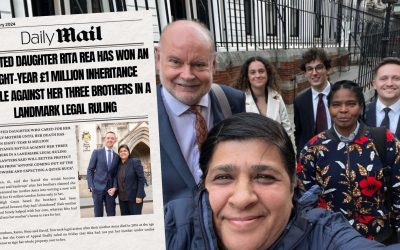In this article

If you’re in a cohabiting (unmarried, living together) couple and one of you passes away, what happens?
A lot of people assume that their partner is always the default when it comes to inheritance, next of kin, and power of attorney. But this is only the case for married couples or those in a civil partnership.
The rules here are vastly different for married and unmarried couples. As cohabitation is on the rise, we want to help spread awareness of your rights.
In this blog, we outline what happens when you’re unmarried and your partner dies. We cover what happens to your estate when you pass away, how you can cover yourself and your partner, and things you should think about preparing before you pass away.
More questions about your rights as a cohabiting couple? Call our family law solicitors on 020 3007 5500, or submit a contact form.
The importance of a will for unmarried couples
If you’re unmarried and have no will, your partner won’t be legally entitled to anything.
Your partner can challenge this upon your passing. But, this isn’t ideal for someone who is already dealing with the loss of their loved one.
Wills can save a huge amount of time, money, and stress for family members upon your passing. They can include:
- Who is going to distribute your assets
- Who is going to receive your assets
- Pet arrangements
- Preferred guardians for young children
- Gifts
- Funeral wishes
It’s of common belief that you only need a will when you’re old or long-term ill, but this isn’t true. A will is important from the moment you own a home, have children, or start your own business. This is especially true for unmarried couples who want to pass their assets to their partner.

Talk to us now. Reduce stress further down the line.
Lines open 24/7

Protecting your assets with a cohabitation agreement
Cohabitation agreements are the perfect way for an unmarried couple living together to protect their assets. Your agreement covers who will own what in the event of a breakup. They can be compared to a prenup in that they ensure both parties are covered fairly and avoid conflict later down the line.
Do we need a cohabitation agreement and a will?
Yes. Your cohabitation agreement could cover what will happen to your property upon break up or death but this won’t cover your whole estate.
A will is important as it covers what will happen to your whole estate, your arrangements after you pass, and the guardianship of children.
It’s important to note that your will also specifies other people who are to inherit from your estate. Your Cohabitation Agreement only covers affairs between you and your partner.
Don’t forget
If you have life insurance and pension plans, make sure you communicate with them about what your wishes are. You can assign beneficiaries to your policy which will allow the named people to claim. This is a great way to ensure your partner’s access to the funds.
If you’re unmarried and your partner dies, what happens to the property?
The general consensus is that an unmarried partner has no rights unless stated in the will.
Joint tenants
The rules are slightly different if you’re joint tenants, as your partner would gain full ownership of the house through a right of survivorship.
Tenants in common
When a declaration of trust is in place between tenants in common, both people will own their share of the property separately. When one person passes away, their share of the property will go to the person stated in their will. If there is no will, the house share will go to the next closest relative.
If you are tenants in common and want your partner to receive your house share when you pass away, you must declare this in your will.
One person owns the house
If you’re the sole owner of the house it’s even more important to create a will if you want your partner to inherit your house when you pass away. If you die without a will (intestate) your partner may get nothing and your house will go to your closest relative.
Renting
When you rent with your partner you’re both typically on the tenancy agreement. If one of you passes away, the other tenant can stay, but you should inform your landlord in case the tenancy agreement needs updating.
What about common law partners?
Common Law Marriage is a medieval practice that is no longer applicable.
Although many people believe they achieve common-law marriage status after living with their partner for a certain period, this is actually a myth.
Want to clarify your rights as an unmarried couple?
Don’t worry, we’re here to give the advice you need when you need it. Just contact us to arrange an appointment.
Lines open 24/7
020 3007 5500
If I’m unmarried who is my next of kin?
When you lose mental capacity, decision-making on your behalf will usually fall to your next of kin.
In England and Wales, your next of kin is automatically assigned to either your spouse or civil partner, and then your blood relatives in order of closeness e.g. parents, children, siblings and so on.
Unmarried partners aren’t considered next of kin apart from a few scenarios. For example, the NHS may require you to write down your next of kin if you’re admitted to a hospital and you can submit your partner’s details.
Next of kin doesn’t necessarily give people the legal right to do things on your behalf. In order to do this, you would need to set up a power of attorney.
What is the role of a power of attorney?
A power of attorney is the legal appointment of someone who can make decisions on your behalf.
Your power of attorney can make decisions on your:
- Healthcare
- Finances
- Property
You might need your power of attorney to make all decisions for you due to developing dementia. Or, you may physically depend on another person to carry out tasks for you such as handling money.
What if someone no longer has the capacity to appoint a power of attorney?
You can apply to the court of protection for deputyship which, if granted, will allow you to manage your partner’s affairs.
As an unmarried couple, there are a few ways to keep yourself and your assets covered.
A will is the best way to cover your assets in the future and ensure your affairs are in order, regardless of your age. And a cohabitation agreement is a great way to protect your assets now. Power of attorney is important if you want your partner to have rights over decisions on your behalf, especially if you have a long-term illness.
Staying organised is so important for both you and your partner, in what can already be a stressful time.
How can Britton and Time Solicitors help?
We know the topic of death can be difficult to navigate. That’s why our initial consultations with our solicitors offer you:
- Unlimited time to go through the details of your case and ask any questions you may have
- An overview of your legal standpoint and your available options
- A precise time and fee estimate for your case
To arrange your initial consultation with one of our solicitors, simply call us on 020 3007 5500.





0 Comments